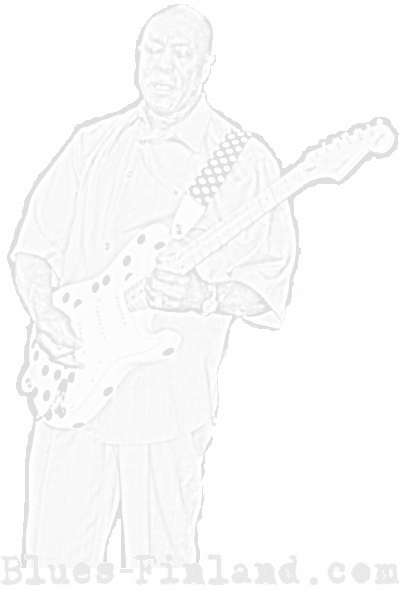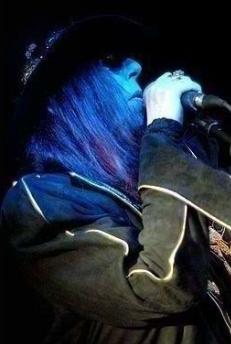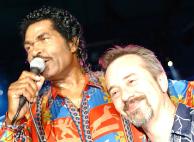 |
| Contact: admin(a)blues-finland.com (c) 2007 Blues-Finland.com |
| Le Blues 6 April 2007 From the glory days of Sidney Bechet and Louis Armstrong, so vividly related by Mezz Mezzrow in his 1946 autobiography "Really The Blues", France seems to have been something of a promised land for many blues and jazz musicians. Today, the French blues scene supports a variety of styles virtually unparallelled in Europe. To get a better idea of the past and present of the blues in France, I talked to blues writer René Malines and powerhouse vocalist Nina Van Horn. Brother of the great country blues guitarist Roland Malines and former head of the French Blues Society, René has spent years advocating the blues in France and introducing French artists to the world. A one-time US resident, Nina has spent time touring with the likes of Chuck Berry and Eric Burdon there, and is rumoured to be appearing with Janis Joplin associates Big Brother & the Holding Company later this year. Looking from the outside, it seems France has been a haven for jazz and blues musicians since the first half of the 20th century. Would you agree, and if so, what is it about African American music that attracts the audiences in France? |
 |
| Nina Van Horn (c) Jean-Luc Karcher |
| René: There are several levels to the answer. Firstly, the general French public first encountered jazz, and blues too, through – mostly African American – US soldiers who had brought instruments and records with them. I guess the whole vibe of finally being free after living several years in the horror of war had everybody wanting to rejoice, and the music of the American allies probably felt as a perfect match. Secondly, blues and jazz share a vital element: both can touch the listener deep. Jazz may take some getting used to, the new listener's ear may have to be taught how to appreciate the sound, but the blues in its apparent simplicity can touch anyone's heart, as long as they're just a little open. One doesn't need to be used to it. And thirdly, although there is racism in France, I guess the American myth makes the African Americans different from other Africans or foreigners in the eyes of average French men and women. Nina: France has always been, and Paris in particular, a place of good audience for jazz and blues. It all started with the arrival of the American army in 1945, they brought jazz with them and this music became a symbol of happiness, the liberation music for the youth that had survived the war. Also, the black soldiers, and among them some jazz and blues artists, felt so much more welcome here compared to the apartheid that was going on at the same time in the US. No wonder they wanted to play and stay in the clubs where they were not obliged to take the back door to get in! René: There's one element I forgot to mention about the discovery of blues music, not only in France, but in all of Europe: the American Folk Blues Festivals from 1962 to 1985! Also, in France in the 60's, a young French folk singer by the name of Hugues Aufray adapted Bob Dylan's songs, helping to make Dylan known in France. When new French fans started buying Dylan's music, they found out about country blues, too, since Bob did cover a few songs by Delta bluesmen on his first album. Believe it or not, now Hugues Aufray is considered totally corny and only gets gigs at small venues, while in the 60's, he was a national star. You seem to be referring to WW2 and the post-war period; what about before the war? René: Actually, I was referring to WW1 and WW2. My good friend Philippe Sauret, the guy who helped me find out and fall in love with Zydeco music, wrote a great text about how the French discovered the blues. It was published on the internet at www.gazettegreenwood.net, too bad it's in French only... But reading his work, I was surprised how popular Bessie Smith was in France between WW1 and WW2. Of course, American music left a deeper mark on the French after WW2, because then, American soldiers stayed camped here for years before De Gaulle decided that it was enough and firmly told the American administration to bring the boys back home. So before they did pack up and leave, they had blue jeans, chewing gum, cigarettes - believe it or not, no one knew about blond tobacco here before - and records. But some French did get familiar with jazz and blues after WW1. My own father, who fought in WW2, loved jazz when he was younger. He even bought a clarinet and started playing it. My grandfather, his father, played slide guitar on his lap and banjo. At the moment, the biggest music scene in this part of the world seems to be the metal scene. What about France – where does the blues stand in comparison to all the "other musics"? Nina: In France, blues is surviving thanks to many associations and people who support it and organize festivals, concerts, speak about it in specialized media. The music survives because of them, but the general media and big radio channels don't cooperate. Jazz is classified as little bit more "intellectual" than blues and has a better opening in the media. Don't be blind, the fight of blues artists for a sunnier place is constant in France, but luckily the public is always there to support festivals. René: As in most other countries, blues remains kind of marginal in France. But it does have its hardcore, die-hard fans. We are just not that many. Could you describe a typical French blues fan, if there is such a thing? René: Ten years ago, I could have. I would have said there were the older, white-haired fans, who came to blues music through their passion for jazz that started when WWII ended. And then there were the others, mostly men in their 40's, 50's or early 60's, who came to blues through rock music, those I like to call "the Woodstock generation". But something happened. Probably because of the blues wave that started in the 80's and reached its peak in the 90's, in the middle of the latter, a whole new French blues scene emerged, apparently "out of the blue", if I may say so. After having only a few French blues artists such as Benoit Blue Boy who issued the first ever 100% blues album by a Frenchman in 1979, Bill Deraime, whose album came out 3 weeks later, and Paul Personne and Patrick Verbeke, suddenly excellent young bands started popping up all over the country. Being young musicians, they also attracted younger crowds. So today, I don't think there's anything like a typical French blues fan. You'll find young people with a metal or garage rock background, even hip-hop and rap fans turning to blues, middle-aged wealthy people, middle-aged not-so-wealthy, too, and elderly, "seniors", you might say. The only constant seems to be that blues attracts more boys and men that it does girls and women, but even that is starting to change. Nina: I'd say mostly over 30 and up. Some are very passionate and know all about the history of the music, and some are just here because it is a sharing music. But we see more and more of their children, who think there is real energy in the blues, something "true" compared to other kinds of music. Could you describe a typical French blues band - somehow, I get the feeling that France is less dominated by SRV clones and Blues Brothers cover bands than certain other countries...? Nina: It is true, most of the young bands I see stop playing SRV quite quickly to come back to the roots, and generally Chicago Blues is favoured... Most French blues artists are dedicated to their own songs and do not play many covers, except in jam sessions. They are very creative and some even try to insert new sounds in the blues, which is a good way to bridge the gap between generations. René: Well, we do have a couple of SRV/Hendrix clones and Blues Brothers cover bands, but you just don't get to see them on the blues circuit. |
 |
| Bobby Rush with René Malines (c) Patrick Bertrand |
| René: People keep complaining that more and more venues are closing down, or switching to DJ's, or not allowing live music anymore. On the other hand, we have more blues festivals, from one day long to two weeks in a row that we can go to. It's great for the blues lover, it's terrible for the musician who needs to make a living even when it's not the festival season. Nina: Festivals and clubs have been suffering over the last years, and many places are closing. As the media is not relating people enough to that music, some places have problems remaining open. It also goes together with unemployment and the lack of money and for many people, and the general sadness of our society. Culture is not a priority for the deciders, and all the levels are struggling. How do you picture the future of blues music? Nina: I think people are getting tired of small voices and sad pop songs and that they wanna see real performances, too... Only rock and blues are able to give them artists who want to expose their feelings in music. I am in touch with young people playing this music in the deep Africa, the coldest north or the hottest countries, so I think it will survive despite the poor help from TV and radio. René: I'm not a fortune teller, so I can't really say. But seeing how the blues has developed in Europe, even with rather confidential scenes, and all over the world, I'm confident that "the Blues is here to stay". At least for a while. I don't think I'll see the end of it in this lifetime. ANDRES ROOTS Links: Nina Van Horn, Nina Van Horn MySpace, Virus de Blues (fanzine), Roland Malines |
| And I don't think there is what could be called a typical French kind of band either. You have so many different styles. We have jump blues bands, we have Chicago blues bands, we have solo acoustic acts, acoustic duos, Texas blues bands, every kind of blues, really, including some artists trying to make the blues evolve. I guess the main thing is that since the French blues scene is so young - like I said, it really started about 10 to 12 years ago apart from those French blues pioneers I mentioned before - there is a lot of joyful energy and imagination a lot of our acts have to offer. What is the live music scene like in France - are there enough venues, are people actively going out to see bands...? |

